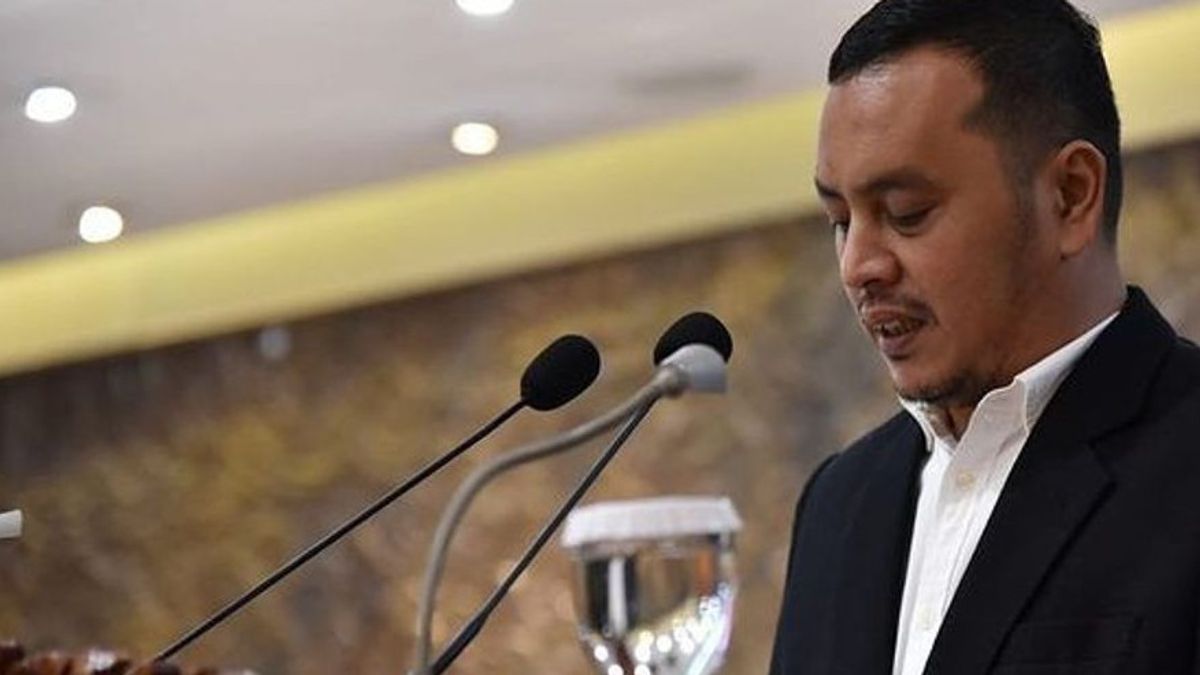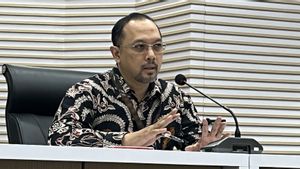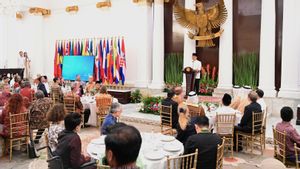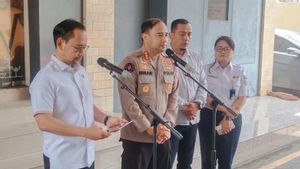JAKARTA - The DPR continues to try to hear and respond to public concerns about the issue of sexual violence. The Bill on the Crime of Sexual Violence (TPKS) is a form of concern for the people's representative institutions to accommodate public aspirations.
In the discussion entitled 'Stop Sexual Violence Around Us! Listen, Care and Response (DPR) in the context of the International Day for the Elimination of Violence against Women' at the DPR Building, Parliament Complex, Jakarta, Friday, November 26, the TPKS Bill received the spotlight. Various elements voiced their hope that this bill would be passed quickly.
The Executive Director of the Women's Journal, Abby Gina Boang Manalu, who was the moderator, said that the high number of cases of sexual violence in Indonesia had become an iceberg phenomenon. The public is waiting for comprehensive regulations to protect victims of sexual violence.
"According to Komnas Perempuan data, the highest number of sexual violence is the second highest compared to other types of violence. The hope is from the community that there is a law that regulates and handles this comprehensively because various data show that there are many cases of sexual violence that are difficult to process," said Gina.
Journal of Women saw many victims who were reluctant to report sexual violence because of socio-cultural problems in society. Gina gave an example, when the victim was blamed when she confessed to being sexually assaulted.
"Our legal system does not recognize this issue, so victims often experience re-victimization. So we have high hopes for the TPKS Bill," he said.

The chairman of the DPR RI TPKS Bill, Willy Aditya, revealed the substance of this bill. He said the TPKS Bill was needed as a form of protection for victims because the current laws such as the Criminal Code, the Law on the Eradication of Criminal Acts of Trafficking in Persons, the Marriage Law, the ITE Law, and the Law on Pornography could not yet become a legal umbrella to protect victims of sexual violence.
“The TPKS Bill is needed in two areas. First, how do victims get justice and protection, so that law enforcement officers, especially the police and prosecutors, have legal standing in taking action," said Willy.
This is important considering that law enforcement works based on positive law. Willy said that many victims of sexual violence did not report it because in reality, sexuality was still considered a disgrace or a taboo subject.
“Victims of sexual violence have fallen, hit by stairs, slapped by stones, shouted again. They talk but are then blamed for wearing short skirts. Like this, not once or twice," he said.
“So there is no place where they seek justice. So this TPKS Bill is what we need,” continued Willy.
The second area that needs to be regulated through the TPKS Bill is the issue of separating public and private affairs. What is important is how sexual freedom, sexual deviation and sexual violence can be regulated through regulation.
“Separating where res publica (public affairs) and res privata (private affairs). Now we want to set the res publica. It just so happens that the object is sexuality. This is often a debate in Panja,” explained Willy.
The Deputy Chairman of the Legislation Body (Baleg) of the DPR RI said that the crucial points in the TPKS Bill had actually been agreed upon. Willy detailed that the crucial points include the title of the law, systematics, protection for victims, and the methodology for the trial of sexual violence cases.
“The trial methodology is either closed or limited. Di Panja was chosen to be closed to protect the victims. And the most important thing is the procedural law, in the Criminal Code, 3 pieces of evidence are needed. In the TPKS Bill, the victim's testimony can be used as evidence. So this is a progressive law towards justice,” he explained.
“All that remains is the political will for a plenary session and it is brought to the plenary. I want that before the trial period is over on December 15, it can be plenary, even finalized as a DPR initiative bill,” added Willy.
Support for the TPKS Bill also came from the PBNU Institute for Human Resource Studies and Development (Lakpesdam). Several rejections of the TPKS Bill are known to often come from religious circles.
“Whatever the religion, it must prohibit sexual violence. Because sexual violence is a clear violation of human rights and blasphemy. Also against God's law. So all religions reject sexual violence, no one allows it," said Secretary of PBNU Lakpesdam, KH Marzuki Wahid.

According to him, the state must be present to provide protection to victims of sexual violence. Marzuki said that the TPKS Bill is a candidate for a legal umbrella that protects and guarantees recovery for victims.
“I did not find a single article in the TPKS Bill that legalized adultery or LGBT. Because the TPKS Bill regulates the punishment of perpetrators, protecting victims and preventing sexual violence,” he explained.
Marzuki said that sexual violence is worse than corruption. Therefore, the TPKS Bill is needed to protect the public.
“Corruption is a serious crime but sexual violence is more serious than corruption because victims of sexual violence cannot be restored to their dignity, honor, not to mention victims have trauma. We, on behalf of the clergy, support the TPKS Bill to be ratified immediately,” said Marzuki.
Meanwhile, the Chair of the Presidium of the Parliamentary Women's Caucus, Diah Pitaloka said that the TPKS Bill was identical with women. Because 90% of victims of violence that occurred in Indonesia came from women, so the TPKS Bill was considered a morale boost from the DPR.
“Emancipation is the substance of democracy's agenda. This emancipation narrative must not subside, it must continue to live in the struggle in the DPR. And emancipation is not automatically the obligation of women, because emancipation is also owned by men as part of the spirit of democracy, "said Diah.
The deputy chairman of Commission VIII of the DPR underlined how the DPR's struggle for the emancipation of women was not based on gender. Diah gave an example of how the Chair of the Working Committee on the TPKS Bill was chaired by a man.
"And Alhamdulillah, friends from the DPR, including in the DPD, especially the women, have voiced the need to eliminate violence against women," he said.
Although the TPKS Bill is still hampered by a number of debates between factions in the DPR, Diah is optimistic that this bill can be passed. Moreover, the spirit of members of the DPR this period regarding the TPKS Bill is somewhat better.
“If this bill fails to be passed, what will happen to the victims or cases of sexual violence. We must respond through legal products. Don't let the many cases of sexual violence become the face of Indonesian civilization," Diah said.
“This problem is real, so how do we fight for justice. This is in our social interest because sexual violence has become a public issue,” he added.
Sarinah Institute researcher, Luky Sandra Amalia, said sexual violence was also related to Pancasila.
"If this is related to Pancasila, then understanding Pancasila must be traced because we cannot achieve social justice for all Indonesian people if we cannot realize a just and civilized humanity," said Luky.
Amalia reminded that women cannot work alone to stop sexual violence. Moreover, men, based on available data, are the most common perpetrators of sexual violence so far.
“By making men as allies, we can turn them from power abusers into challenge makers, so it is necessary to have men in the process of enacting this law. And I hope the media can help blow up so that they can encourage legislative friends to immediately ratify the TPKS Bill," concluded Amalia.
The English, Chinese, Japanese, Arabic, and French versions are automatically generated by the AI. So there may still be inaccuracies in translating, please always see Indonesian as our main language. (system supported by DigitalSiber.id)













